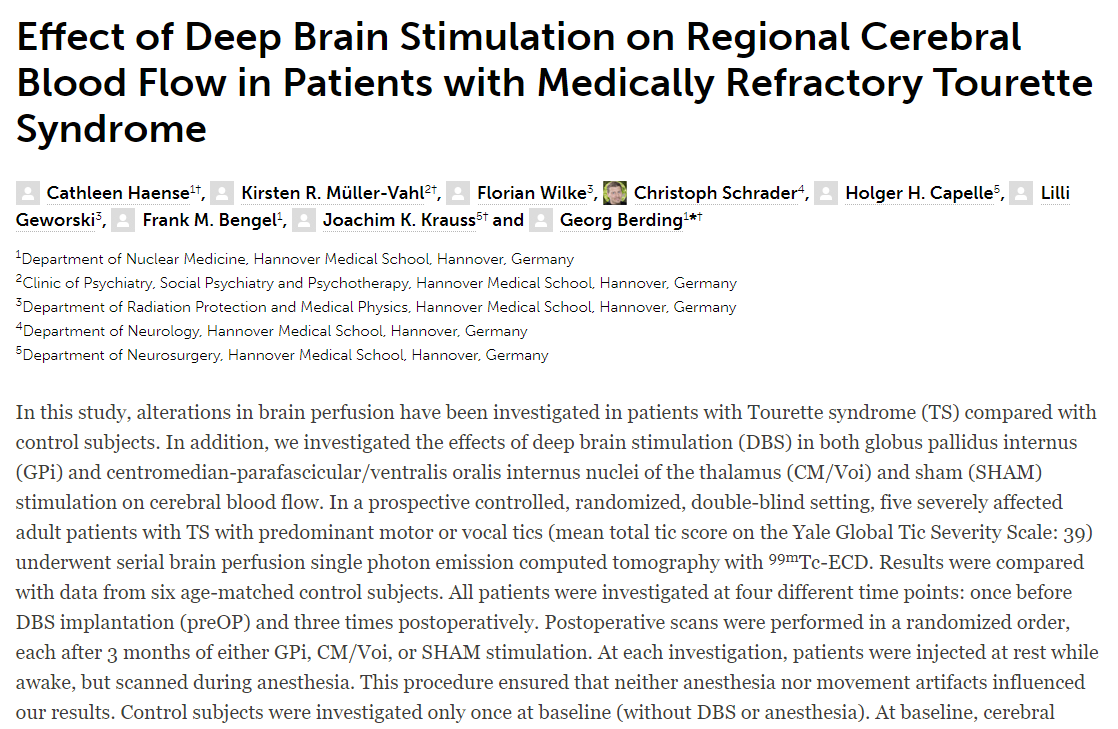Effect of Deep Brain Stimulation on Regional Cerebral Blood Flow in Patients with Medically Refractory Tourette Syndrome(深部脑刺激对难治性抽动秽语综合征患者局部脑血流的影响)
In this study, alterations in brain perfusion have been investigated in patients with Tourette syndrome (TS) compared with control subjects. In addition, we investigated the effects of deep brain stimulation (DBS) in both globus pallidus internus (GPi) and centromedian-parafascicular/ventralis oralis internus nuclei of the thalamus (CM/Voi) and sham (SHAM) stimulation on cerebral blood flow. In a prospective controlled, randomized, double-blind setting, five severely affected adult patients with TS with predominant motor or vocal tics (mean total tic score on the Yale Global Tic Severity Scale: 39) underwent serial brain perfusion single photon emission computed tomography with 99mTc-ECD. Results were compared with data from six age-matched control subjects. All patients were investigated at four different time points: once before DBS implantation (preOP) and three times postoperatively. Postoperative scans were performed in a randomized order, each after 3 months of either GPi, CM/Voi, or SHAM stimulation. At each investigation, patients were injected at rest while awake, but scanned during anesthesia. This procedure ensured that neither anesthesia nor movement artifacts influenced our results. Control subjects were investigated only once at baseline (without DBS or anesthesia). At baseline, cerebral blood flow was significantly reduced in patients with TS (preOP) compared with controls in the central region, frontal, and parietal lobe, specifically in Brodmann areas 1, 4-9, 30, 31, and 40. Significantly increased perfusion was found in the cerebellum. When comparing SHAM stimulation to preOP condition, we found significantly decreased perfusion in basal ganglia and thalamus, but increased perfusion in different parts of the frontal cortex. Compared with SHAM condition both GPi and thalamic stimulation resulted in a significant decrease in cerebral blood flow in basal ganglia and cerebellum, while perfusion in the frontal cortex was significantly increased. Our results provide substantial evidence that, in TS, brain perfusion is altered in the frontal cortex and the cerebellum and that these changes can be reversed by both GPi and CM/Voi DBS.
在这项研究中,与对照组相比,对患有Tourette综合征(TS)的患者进行了脑灌注改变的研究。此外,我们研究了苍白球内脏(GPi)和丘脑的着丝粒体-束旁/腹侧内核(CM / Voi)和假(SHAM)刺激对大脑血流的影响。在前瞻性对照,随机,双盲背景下,对五名严重运动受累的成年TS运动或声带抽动为主的成年患者(在Yale Global Tic严重度量表上的平均总抽动得分:39)进行了连续脑灌注单光子发射计算机断层扫描99mTc-ECD。将结果与六个年龄匹配的对照组的数据进行了比较。在四个不同的时间点对全部患者进行了调查:一次在DBS植入前(preOP),一次在术后3次。GPi,CM / Voi或SHAM刺激3个月后,以随机顺序进行术后扫描。在每次检查中,患者在清醒时均被静注,但在麻醉期间进行扫描。该程序确保麻醉或运动伪影均不会影响我们的结果。对照组仅在基线时进行了一次检查(无DBS或麻醉)。基线时,与中部,额叶和顶叶的对照相比,TS(preOP)患者的脑血流量显着减少,特别是在Brodmann地区1、4-9、30、31和40。小脑灌注明显增加。当将SHAM刺激与preOP条件进行比较时,我们发现基底神经节和丘脑的灌注明显减少,但额叶皮层不同部位的灌注却增加了。与SHAM条件相比,GPi和丘脑刺激均导致基底神经节和小脑的脑血流量显着减少,而额叶皮层的灌注明显增加。我们的结果提供了充分的证据,在TS中,额叶皮层和小脑的脑灌注发生了变化,GPi和CM / Voi DBS均可逆转这些变化。但额叶皮层不同部位的灌注增加。与SHAM条件相比,GPi和丘脑刺激均导致基底神经节和小脑的脑血流量显着减少,而额叶皮层的灌注明显增加。我们的结果提供了充分的证据,在TS中,额叶皮层和小脑的脑灌注发生了变化,GPi和CM / Voi DBS均可逆转这些变化。但额叶皮层不同部位的灌注增加。与SHAM条件相比,GPi和丘脑刺激均导致基底神经节和小脑的脑血流量显着减少,而额叶皮层的灌注明显增加。我们的结果提供了充分的证据,在TS中,额叶皮层和小脑的脑灌注发生了变化,GPi和CM / Voi DBS均可逆转这些变化。

文献来源:<https://www.frontiersin.org/articles/10.3389/fpsyt.2016.00118/full>
论文合作者之一德国Joachim K. Krauss教授是INC国际神经外科医生集团旗下国际神经外科顾问团成员,也是国际功能性神经外科专家,主要的临床研究集中在复杂的脊柱神经外科手术、功能性神经外科手术(帕金森病、癫痫)和颅底手术上,提出了脊柱治疗上的几个新的治疗概念。
Joachim K. Krauss教授的擅长包括神经肿瘤学、小儿神经外科、血管神经外科、颅底神经外科、脊柱外科、脊柱外科、重建立体定向与功能神经外科、创伤神经外科、疼痛神经外科、脑积水外科等,涵盖面较为广泛,是神经外科领域的全能型专家。与此同时,Joachim K. Krauss教授在汉诺威医学院(MHH)中的医疗团队由高度化的专家组成,并在神经外科治疗中合适使用计算机断层扫描(CT)和磁共振成像(MRI),从而合适将患者的治疗提高到平均值以上。




